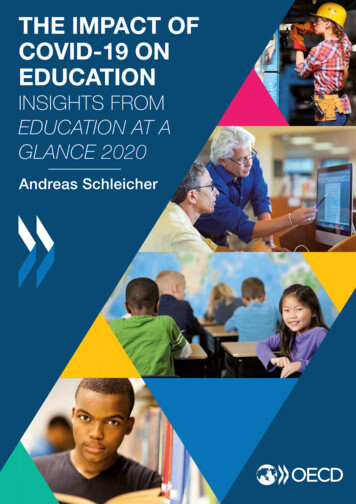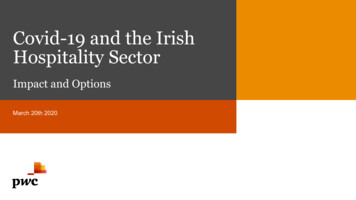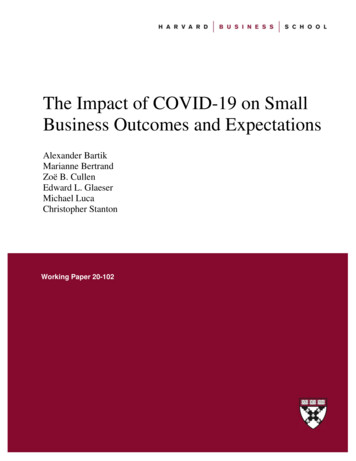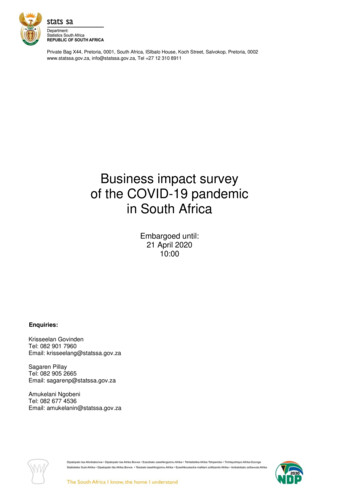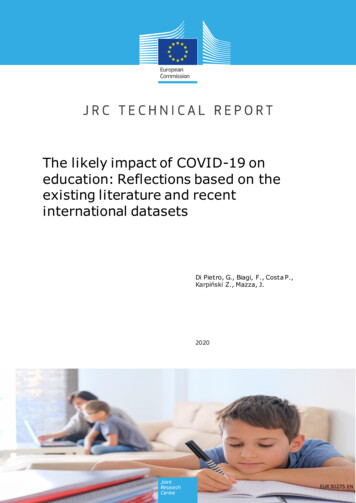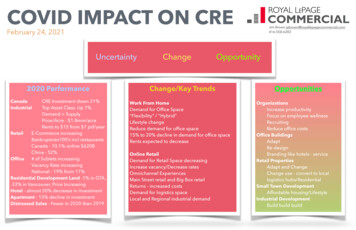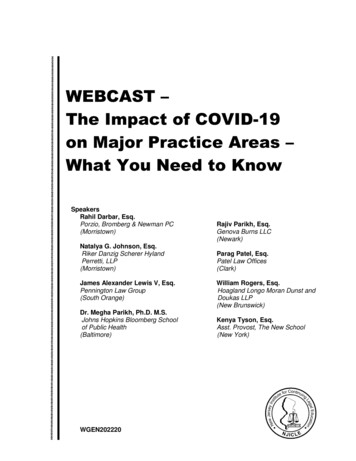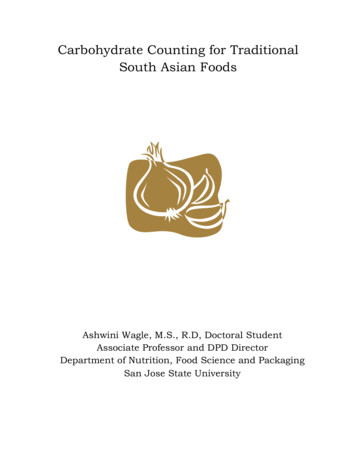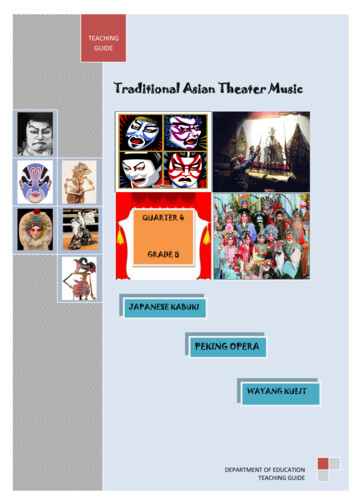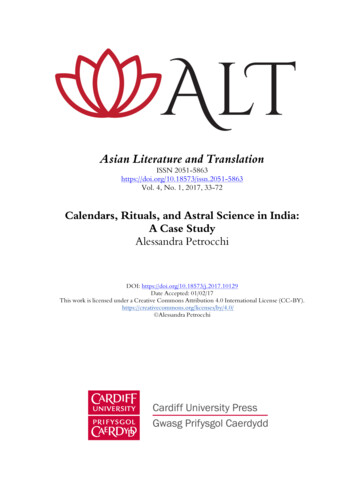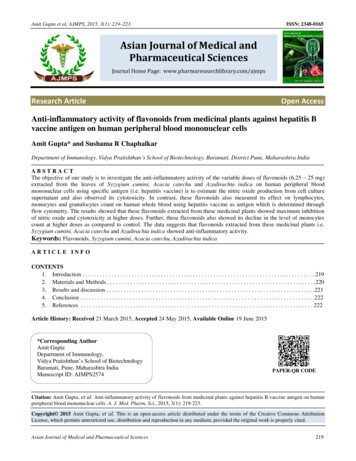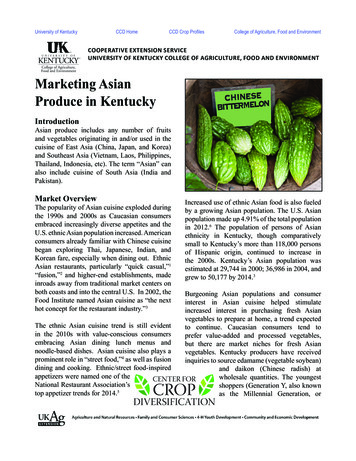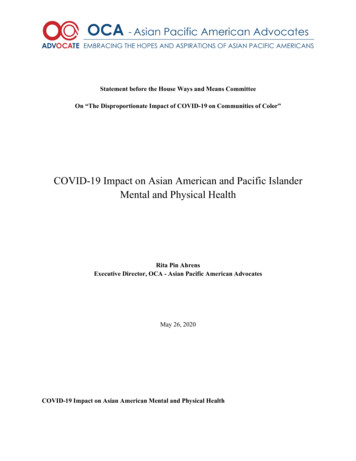
Transcription
Statement before the House Ways and Means CommitteeOn “The Disproportionate Impact of COVID-19 on Communities of Color”COVID-19 Impact on Asian American and Pacific IslanderMental and Physical HealthRita Pin AhrensExecutive Director, OCA - Asian Pacific American AdvocatesMay 26, 2020COVID-19 Impact on Asian American Mental and Physical Health
Chairman Davis, Ranking Member Brady, and members of the committee. Thank you for conducting thishearing on the disparate health impacts of the COVID-19 pandemic. This is an important issue asCongress moves forward rapidly to ensure safety for tens of millions of unemployed American workersand financially unstable families. At the same time, Asian American communities around the countryhave experienced an alarming surge in anti-Asian sentiment and hate incidents since the start of theoutbreak. Therefore, my testimony primarily covers the negative impact of hate incidents on AsianAmerican mental and physical health outcomes. First, hate incidents against Asian Americans have risentremendously in number and severity since the start of the COVID-19 pandemic. Second, stress and fearcaused by hate incidents is proven to impact mental and physical health outcomes, especially as they arelinked to generational trauma. Third, to minimize hate incidents, Americans need strong coordination atthe federal level in issuing guidance to schools, employers, local law enforcements, and publicadministrators to prevent and react to hate incidents.Unprecedented Rise in Hate Incidents Against Asian Americans Since Start of PandemicAsian American communities around the country have experienced an alarming surge in anti-Asiansentiment since the start of the outbreak.1 Asian Americans report being subjected to hateful tirades, beingrefused service in public areas, assault, and worse. OCA - Asian Pacific American Advocates and partnerorganizations have received over 1,900 individual reports of hate incidents and crimes against AsianAmericans since January alone.2 These incidents range in severity and are markedly widespread, havingbeen reported across 46 states.For example, on March 14th, a 47-year-old father and his 10-year-old son were followed and attacked inQueens, NY at a bus stop.3 The assailant struck the father on the head in front of his son. On the sameday, an Asian American family fell victim to a knife attack while shopping at a Sam’s Club in Midland,TX.4 In the San Fernando Valley, CA, a 16-year old Asian American boy was physically assaulted atschool after being accused of having the coronavirus.5 And at the University of Virginia inCharlottesville, two Chinese international students were attacked with raw eggs thrown from a movingvehicle.6 We know these incidents to be merely the tip of the iceberg, as hate crimes have long beenseverely under-reported and inadequately defined. As these racially-motivated attacks accelerate in themidst of the coronavirus crisis, it becomes increasingly imperative that this nation’s leadership ensuresthe safety and wellbeing of Asian Americans and Pacific Islanders (AAPIs).Hate incidents have been primarily driven by the stigma associated with COVID-19 (as it originated inHubei Province, China). Assailants may assume that anybody with perceived Asian ancestry might carrythe disease. However, the Centers for Disease Control (CDC) maintains that ethnicity is not a risk factorfor transmission of COVID-19.7 But continued associations between COVID-19 and Asian peopleperpetuate age-old stereotypes of Asian people and culture being “dirty” and “diseased” directly enablesfurther attacks on Asian Americans. The renewed prevalence of these stereotypes also contributes tolowered self-esteem and higher stress levels, resulting in negative mental health outcomes across AsianAmerican communities.
Hate-Related Health OutcomesThese hundreds of reported hate incidents, as well as the likely hundreds unreported, create a climate ofreal and perceived danger and unwelcomeness in one’s own home, a common experience among AsianAmericans worsened by COVID-related hate. In a time when everyone’s mental health is alreadyimpacted,8 many Asian Americans have already reported feeling unsafe walking in their ownneighborhood or even leaving their home.9 Multiple studies demonstrate a link between racialdiscrimination against Asian Americans and their increased risk of developing mental illnesses such asdepression and anxiety disorders.10,11 Additionally, it is well documented that Native Hawaiians andAsian Americans, among other people of color, experience higher rates of post-traumatic stress disorder(PTSD).12 It is likely that pandemic-related stress will continue to exacerbate existing mental healthdisparities, as Asian Americans are continuously bombarded with news of businesses and neighborhoodsvandalized,13 hate incidents disproportionately targeting Asian American women,14 and attemptedmurders.15We further know that the stress caused by racism and hate incidents can have a cumulative effect on thephysical health of people of color on both individual and structural levels.16 Researchers identify racismand discrimination as one of the root causes of racial health disparities.17 With Asian Americans andPacific Islanders already facing significant health inequities due to language barriers,18 fear of publiccharge classification,19 cost barriers, prevalence of diabetes and other chronic diseases,20 and culturalstigma,21 it is now more important than ever to reduce the burden of health disparities on AsianAmericans and Pacific Islanders.Federal Action is RequiredIn addition to directly addressing impacted AAPI mental and physical health outcomes, Congress mustalso take action at the root of the issue: COVID-driven hate incidents and discrimination targeting AsianAmericans. It is clear that Asian American communities around the country need a coordinated effort onthe federal level, best achieved through an interagency task force. The task force would prioritize hateincidents against Asian Americans and address the rise in discrimination by issuing clear guidance toschools, employers, local law enforcement, and public administrators. Additionally, the task force wouldpublish ethnicity- and geography-specific disaggregated hate crimes data so that local jurisdictions andallied organizations can best prioritize funds. Federal employees would collaborate across Departments ofHealth and Human Services, Commerce, Justice, Education, and more to build a comprehensive responseto the rise in hate incidents. OCA - Asian Pacific American Advocates and hundreds of alliedorganizations have been advocating for such a task force since March.22 It is also a priority that Housemembers prioritize the Jabara-Heyer NO HATE Act (Division S, Title X) in the final HEROES Act bill.On behalf of Asian Americans and Pacific Islanders around the country experiencing health disparitiesdue to structural and interpersonal racism, we urge the House Ways and Means Committee to make antidiscrimination provisions a top priority for future federal appropriations.
Endnotes1. No Author. “Covid-19 Fueling Anti-Asian Racism and Xenophobia Worldwide.” Human Rights Watch, May12th, 2020. Retrieved from ng-anti-asian-racism-andxenophobia-worldwide2. National Council of Asian Pacific Americans. “Hate Incidents.” AAPI Emergency Response Network.Washington, DC: 2020. Retrieved from https://www.aapiern.org/hate-incidents3. Henry, Jacob and Olivia Bensemon. “Victim of possible coronavirus hate crime in Queens speaks out.” New YorkPost, March 14th, 2020. Retrieved from oronavirushate-crime-in-queens-speaks-out/4. Morris, Dana and Violeta Trevizo. “Teen charged in 'racially motivated' Sam's club stabbing.” News West 9,March 14th, 2020. Retrieved from 5. Capatides, Christina. “Bullies Attack Asian American Teen at School, Accusing Him of Having Coronavirus.”CBS News, February 14th, 2020. Retrieved from -coronavirus/6. Popli, Nik. “Chinese International Student Reports Attempted Assault at U.Va.” Cavalier Daily, March 12th,2020. Retrieved from -at-u-va7. World Health Organization. “World Health Organization Best Practices for the Naming of New HumanInfectious Diseases.” May, 2015. Retrieved 65/163636/WHO HSE FOS 15.1 eng.pdf;jsessionid B646C7585BC8F003CBD121B8C513B0F7?sequence 18. Howard, Jacqueline. “The Coronavirus Pandemic's Impact on Global Mental Health is ‘Already ExtremelyConcerning,’ UN says.” CNN, May 14th, 2020. Retrieved avirus-mental-health/index.html9. Yang, Lucy. “Coronavirus News: NYPD Report Shows Bias Crimes Against Asian Americans On The Rise.”ABC 7, May 5th, 2020. Retrieved from wn-covid19/6151239/10. Wang, Jennifer, John Oliver Siy and Sapna Cheryan. “Chapter 10: Racial Discrimination and Mental HealthAmong Asian American Youth.” Asian American and Pacific Islander Children and Mental Health. SantaBarbara, CA: ABC-CLIO, 2011. Pg. 227. Retrieved fromhttps://books.google.com/books?id qxJwoySSHy0C11. No Author. “Racism and Mental Health: Position Statement.” Royal College of Psychiatrists, March 2018.Retrieved from GxVFSv8Ba1 0KH/view?usp sharing12. Carter, Robert T. “Racism and Psychological and Emotional Injury: Recognizing and Assessing Race-BasedTraumatic Stress.” The Counseling Psychologist 35, issue 1 (2007): 13-105. Retrieved fromhttps://drive.google.com/file/d/1QUZ4oe5Z5 KiYoMT8pbzT c kX8fyL7S/view?usp sharing13. Choe, Johnathan. “White Supremacists Spread Hateful Messages in Chinatown, Already Reeling From COVID19.” Komo News, April 5th, 2020. Retrieved from ing-from-covid-1914. Metzgar, Nikki. “Report: AAPI Women 3x More Likely to Report Racist Discrimination than Men over LastWeek.” National Asian Pacific American Women’s Forum, March 30th, 2020. Retrieved . No Author. “FBI Calling Stabbing at Midland Sam’s a Hate Crime.” CBS 7, March 30th, 2020. Retrieved ml16. Office of Disease Prevention and Health Promotion. “Discrimination.” Healthy People 2020. Retrievd onsresources/discrimination17. Gee, Gilbert and Chandra Ford. “Structural Racism and Health Inequities.” DuBois Review 8, no. 1 (2011): 115132. Retrieved from 58/
18. Association of Asian Pacific Community Health Organizations. “Health Centers: Improving Health Care AccessFor Limited English Proficient Patients.” Resources, March 2004. Retrieved fromhttps://www.aapcho.org/resources -limited-englishproficient-patients/19. US Citizenship and Immigration Services. “Public Charge.” Retrieved from es-and-procedures/public-charge20. Association of Asian Pacific Community Health Organizations. “2019 Diabetes In Special & VulnerablePopulations: A National Learning Series – Webinar Resources.” Resources, 2019. Retrieved fromhttps://www.aapcho.org/resources nal-learning-serieswebinar-resources/21. Wong, Eunice, Rebecca Collins, Jennifer Cerully, Rachana Seelam and Beth Roth. “Racial and EthnicDifferences in Mental Illness Stigma and Discrimination Among Californians Experiencing Mental HealthChallenges.” Rand Health Quarterly 6, no. 2 (2017): 6. Retrieved 568160/22. OCA-Asian Pacific American Advocates. “OCA and Over 180 Organizations Petition White House and OthersFor Swift Action on Anti-AAPI Hate Crimes.” Press Releases. Retrieved actionon-antiaapi-hate-crimes
the disease. However, the Centers for Disease Control (CDC) maintains that ethnicity is not a risk factor for transmission of COVID-19.7 But continued associations between COVID-19 and Asian people perpetuate age -old stereotypes of Asian people and culture being “dirty” and “disea
